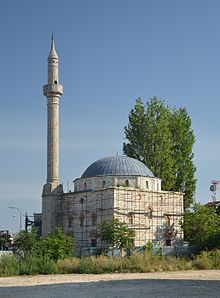| Çarshi Mosque | |
|---|---|
Xhamia e Çarshisë | |
 | |
| Religion | |
| Affiliation | Sunni Islam |
| Location | |
| Location | Pristina |
| Country | Kosovo |
| Geographic coordinates | 42°39′55″N 21°9′55″E / 42.66528°N 21.16528°E |
| Architecture | |
| Type | Mosque |
| Style | Ottoman |
| Completed | 1389 |
The Çarshi Mosque, also known as the Bazaar Mosque and the Taş Mosque (literally, the Stone Mosque) [1] ( Albanian: Xhamia e Çarshisë), is the oldest building in Pristina, Kosovo, and it marks the beginning of the old town. [2] [3] The foundation of this mosque was laid out in 1389 during the rule of the Ottoman Sultan Bayezid I and its construction was continued during the reign of Sultan Murad II in the 15th century. [4] The Çarshi Mosque was built to celebrate the Ottoman victory of 1389 in the Battle of Kosovo. [5] [6] Over the years, the mosque has undergone through several restorations. However, its stone-topped minaret has survived for over six centuries (hence, it is often referred to as the Taş Mosque, or the Stone Mosque). [7] [8]
-
 This article incorporates
text available under the
CC BY-SA 3.0 license.
This article incorporates
text available under the
CC BY-SA 3.0 license.
- ^ Balla, Shefqet (2010). Kosova guide. [Prishtinë]: ABS Books. ISBN 978-9951-8780-4-3. OCLC 882528238.
- ^ Warrander, Gail (2010). Kosovo. Verena Knaus (2nd ed.). Chalfont St. Peter, Bucks: Bradt Travel Guides. ISBN 978-1-84162-331-3. OCLC 653087236.
- ^ Shyqeriu, Banush; Hajdari, Kushtrim (2013-11-01). "Symbolism and Poetics of Autogenic Space and Structures – The New Design Approach on Mosque as Representative Building (Design Proposal for the Central Mosque of Prishtina as Case Study)". 2013 UBT International Conference. Pristina, Kosovo: University for Business and Technology: 8–25. doi: 10.33107/ubt-ic.2013.1. ISBN 978-9951-437-23-3.
- ^ Balla, Shefqet (2010). Kosova guide. [Prishtinë]: ABS Books. ISBN 978-9951-8780-4-3. OCLC 882528238.
- ^ "Curvy Kate - Spring Summer 2010 Lingerie Collection_0". SciVee. 2011-10-28. doi: 10.4016/35746.01. Retrieved 2022-04-26.
- ^ Shyqeriu, Banush; Hajdari, Kushtrim (2013-11-01). "Symbolism and Poetics of Autogenic Space and Structures – The New Design Approach on Mosque as Representative Building (Design Proposal for the Central Mosque of Prishtina as Case Study)". 2013 UBT International Conference. Pristina, Kosovo: University for Business and Technology: 8–25. doi: 10.33107/ubt-ic.2013.1. ISBN 978-9951-437-23-3.
- ^ Warrander, Gail (2010). Kosovo. Verena Knaus (2nd ed.). Chalfont St. Peter, Bucks: Bradt Travel Guides. ISBN 978-1-84162-331-3. OCLC 653087236.
- ^ Shyqeriu, Banush; Hajdari, Kushtrim (2013-11-01). "Symbolism and Poetics of Autogenic Space and Structures – The New Design Approach on Mosque as Representative Building (Design Proposal for the Central Mosque of Prishtina as Case Study)". 2013 UBT International Conference. Pristina, Kosovo: University for Business and Technology: 8–25. doi: 10.33107/ubt-ic.2013.1. ISBN 978-9951-437-23-3.
| Çarshi Mosque | |
|---|---|
Xhamia e Çarshisë | |
 | |
| Religion | |
| Affiliation | Sunni Islam |
| Location | |
| Location | Pristina |
| Country | Kosovo |
| Geographic coordinates | 42°39′55″N 21°9′55″E / 42.66528°N 21.16528°E |
| Architecture | |
| Type | Mosque |
| Style | Ottoman |
| Completed | 1389 |
The Çarshi Mosque, also known as the Bazaar Mosque and the Taş Mosque (literally, the Stone Mosque) [1] ( Albanian: Xhamia e Çarshisë), is the oldest building in Pristina, Kosovo, and it marks the beginning of the old town. [2] [3] The foundation of this mosque was laid out in 1389 during the rule of the Ottoman Sultan Bayezid I and its construction was continued during the reign of Sultan Murad II in the 15th century. [4] The Çarshi Mosque was built to celebrate the Ottoman victory of 1389 in the Battle of Kosovo. [5] [6] Over the years, the mosque has undergone through several restorations. However, its stone-topped minaret has survived for over six centuries (hence, it is often referred to as the Taş Mosque, or the Stone Mosque). [7] [8]
-
 This article incorporates
text available under the
CC BY-SA 3.0 license.
This article incorporates
text available under the
CC BY-SA 3.0 license.
- ^ Balla, Shefqet (2010). Kosova guide. [Prishtinë]: ABS Books. ISBN 978-9951-8780-4-3. OCLC 882528238.
- ^ Warrander, Gail (2010). Kosovo. Verena Knaus (2nd ed.). Chalfont St. Peter, Bucks: Bradt Travel Guides. ISBN 978-1-84162-331-3. OCLC 653087236.
- ^ Shyqeriu, Banush; Hajdari, Kushtrim (2013-11-01). "Symbolism and Poetics of Autogenic Space and Structures – The New Design Approach on Mosque as Representative Building (Design Proposal for the Central Mosque of Prishtina as Case Study)". 2013 UBT International Conference. Pristina, Kosovo: University for Business and Technology: 8–25. doi: 10.33107/ubt-ic.2013.1. ISBN 978-9951-437-23-3.
- ^ Balla, Shefqet (2010). Kosova guide. [Prishtinë]: ABS Books. ISBN 978-9951-8780-4-3. OCLC 882528238.
- ^ "Curvy Kate - Spring Summer 2010 Lingerie Collection_0". SciVee. 2011-10-28. doi: 10.4016/35746.01. Retrieved 2022-04-26.
- ^ Shyqeriu, Banush; Hajdari, Kushtrim (2013-11-01). "Symbolism and Poetics of Autogenic Space and Structures – The New Design Approach on Mosque as Representative Building (Design Proposal for the Central Mosque of Prishtina as Case Study)". 2013 UBT International Conference. Pristina, Kosovo: University for Business and Technology: 8–25. doi: 10.33107/ubt-ic.2013.1. ISBN 978-9951-437-23-3.
- ^ Warrander, Gail (2010). Kosovo. Verena Knaus (2nd ed.). Chalfont St. Peter, Bucks: Bradt Travel Guides. ISBN 978-1-84162-331-3. OCLC 653087236.
- ^ Shyqeriu, Banush; Hajdari, Kushtrim (2013-11-01). "Symbolism and Poetics of Autogenic Space and Structures – The New Design Approach on Mosque as Representative Building (Design Proposal for the Central Mosque of Prishtina as Case Study)". 2013 UBT International Conference. Pristina, Kosovo: University for Business and Technology: 8–25. doi: 10.33107/ubt-ic.2013.1. ISBN 978-9951-437-23-3.

